Blog

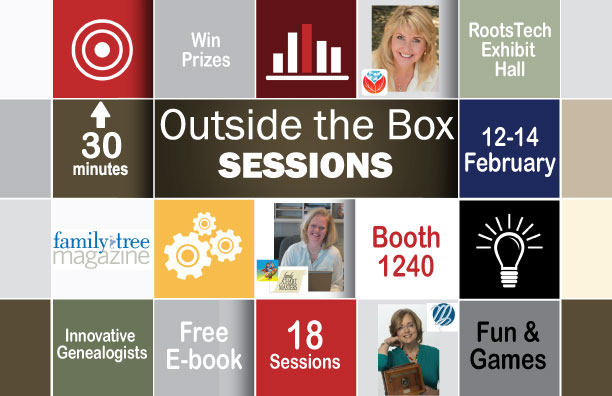
RootsTech / FGS 2015: Free Sessions at Our Booth and PRIZES!
 Back by popular demand! After fabulous response last year, Genealogy Gems will once again be sponsoring “Outside the Box Sessions,” a series of FREE mini-presentations at Booths 1240 & 1242 at RootsTech 2015.
Back by popular demand! After fabulous response last year, Genealogy Gems will once again be sponsoring “Outside the Box Sessions,” a series of FREE mini-presentations at Booths 1240 & 1242 at RootsTech 2015.
Our popular sessions help you think outside the box (and have fun and get free swag while you’re at it). Lisa’s sessions will include:
- Tech Tips for Newspaper Research (Thursday at 12:00);
- How to Use Google Earth for Genealogy (Thursday at 4:00);
- Google for Genealogy: What’s NEW! (Friday at 11:30 and Saturday at 2:00);
- Google Strategies for Common Surnames (Friday at 12:00);
- Win Prizes! Google Earth Genealogy Game Show (Friday from 5:30-6:30-perfect “Happy Hour!” activity);
- iPad Tips and Tricks (Saturday at 10:00);
- Evernote Tips and Tricks (Saturday at 12:30).
FREE EBOOK: Attend any session and receive our free ebook of handouts for all sessions!
 Click here for the full schedule and the Grand Prize entry form (which also gets you the FREE Outside the Box e-book with all session handouts). Drop this entry by Booth #1242 and say hello!
Click here for the full schedule and the Grand Prize entry form (which also gets you the FREE Outside the Box e-book with all session handouts). Drop this entry by Booth #1242 and say hello!
Lisa will also be signing copies of her brand new book The Genealogist’s Google Toolbox Second Edition!
We are again partnering with The Photo Detective Maureen Taylor and Janet Hovorka (author of Zap the Grandma Gap), and Family Tree Magazine.
Here’s a look at the fun we had at NGS last year:
By the way, our RootsTech partner Family ChartMasters is celebrating the release of its NEW pocket guide, The Chart Chick Insider’s Guide to Salt Lake City: Everything A Genealogist Needs to Know Outside the Library. Click here to get a FREE pdf travel guide to Salt Lake City and, if you like, order the book for only $9.95 (pre-order for pickup at RootsTech and pay no shipping, or add on $5 to have it sent to you).
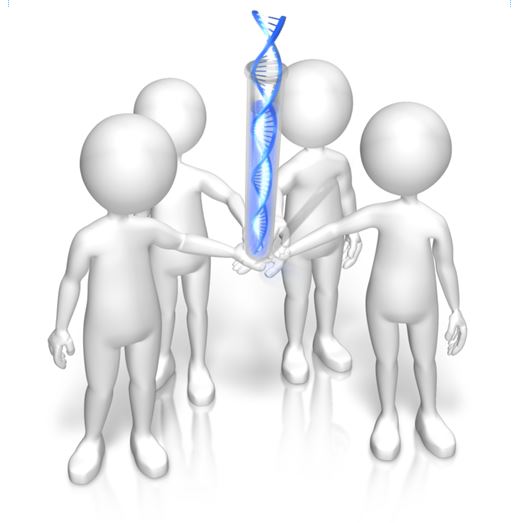
Social Network Your YDNA with Surname Projects
Family history organizations and studies based on individual surnames have been around for years. They are now integrating YDNA research into their efforts. Use surname projects to enhance your paternal DNA research!
Surnames are the flagships of our genealogical research. We name our files after them and we tag our research with them. We wear our last names proudly on pins and necklaces and T-shirts.
But surnames can also be misleading. Illiteracy, language barriers, and just plain carelessness led to misspellings and alterations, not to mention those ancestors who blatantly changed their name to avoid detection.
The advent of YDNA testing has changed the way many genealogists view surnames and their role in their genealogy. Because a man’s YDNA is the same as the YDNA carried by each of the ancestors in his direct paternal line, the YDNA can act like a filter, clearly indicating which men with a particular surname, or variant, truly share a direct paternal line.
So how has YDNA testing affected family organizations that do surname research? I asked Debbie Kennett, a regular contributor to the International Society of Genetic Genealogy Wiki and Facebook page who is also involved with the Guild of One Name Studies. The Guild of One Name Studies was established in 1979 to promote public understanding of one-name studies and preserve the information obtained by those studies.
“Virtually every common surname is now the subject of a DNA project,” says Debbie, including “just over 500 Guild members who are running a DNA project. That number has jumped up considerably just in the last couple of years.”
The quality of those projects varies. Debbie tells us that a quality YDNA project includes three elements: “presenting the DNA data, recruiting people from different countries and also correlating all of the genealogy information.”
Jean Morrison, a member of the Morrison surname project, says that because of DNA testing, “identifying where in Scotland this family originated prior to coming to America ca 1728 has become a realistic goal. The Morrison Q Group has identified through Y line testing at 111 markers, 22 individuals with an MRCA (most recent common ancestor) within eight generations.” In plain English, this means that a definite YDNA pattern has been associated with her Morrison surname and with a common ancestor eight generations back.
Noel and Ron Taylor were two early adopters of YDNA testing for their Taylor family project. Their first samples were submitted to the Sorenson Molecular Genealogy Foundation in 2000. The former president and currently the head of the board of trustees for the Taylor Family Society, Noel says that using DNA “caught the attention of many people in our organization….It renewed great interest in the hearts of many people who had been doing research for many years [who may have] lost interest and were somewhat discouraged.” The Taylors have made significant breakthroughs with their DNA testing. They have connected several Taylor lines back to a common ancestor, verified their paper trails, and even found a line of Hodges that were actually Taylors!
It appears that YDNA is becoming part of the research plan for most family societies. But Debbie tells us that there is still much room for improvement in her organization. “Not all Guild members are running [DNA] projects. We have something like 2,700 Guild members so we are still not at the stage where the majority of Guild members are running projects.”
Besides The Guild, other organizations have been created to assist genealogists with their surname research, including a new organization just launched in November. The Surname Society’s goal is to “to build a collaborative environment where members are encouraged to develop their own approach to the investigation of their surname.”
Kirsty Grey, chairman of the Surname Society, says that DNA testing has taken a front seat role in the research of one of their founders as well as several early members. “DNA is one of the many strands of family history research (and to a greater extent, surname studies) which can connect individuals, often where genealogical research cannot.”
That really is the bottom line. DNA, especially YDNA, can tell you things about the surnames in your pedigree that you can’t learn in any other way. If you haven’t yet, it’s time to jump on the YDNA bandwagon and see what your DNA has to tell you.
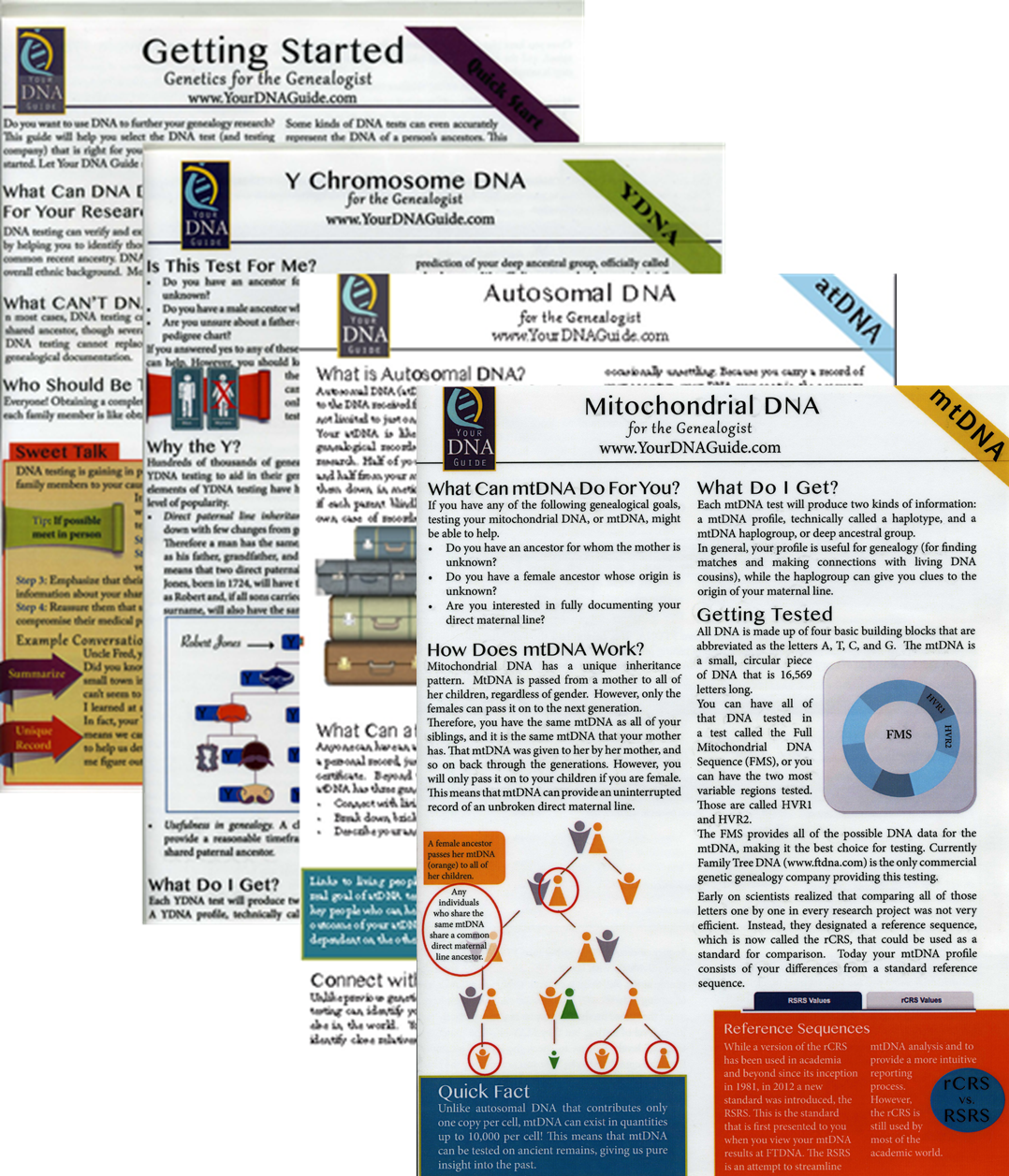 I can help you! Check out my series of quick guides (purchase all 4 laminated guides or the digital download bundle for the best deal):
I can help you! Check out my series of quick guides (purchase all 4 laminated guides or the digital download bundle for the best deal):
- Getting Started: Genetics for Genealogists;
- Y Chromosome DNA for Genealogists;
- Autosomal DNA for Genealogists;and
- NEW! Mitochondrial DNA for Genealogists.
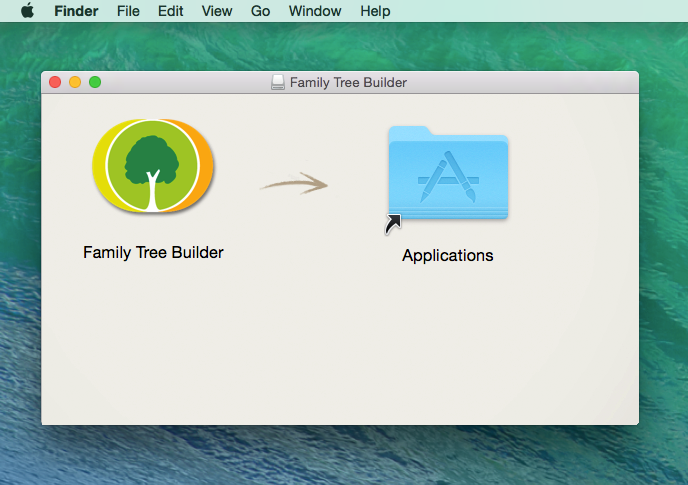
Family Tree Builder for Mac! New Genealogy Software for Mac
Mac users now have their own version of the popular free Family Tree Builder software offered by MyHeritage.com. Says Daniel Horowitz at  MyHeritage.com, “It’s free to download, easy to use and includes all of the main features of the windows version!”
MyHeritage.com, “It’s free to download, easy to use and includes all of the main features of the windows version!”
“There have been frequent requests by our users to run Family Tree Builder 7.0 on the Mac operating system,” states a recent MyHeritage press release. “Many of our users have switched in recent years from Windows to Mac and wanted to continue using Family Tree Builder.”
Here’s some additional information from MyHeritage:
- The current version is called Family Tree Builder Mac Extension. It uses a system for porting Windows software to Mac called CrossOver by CodeWeavers. Once installed, the software will run directly on Mac computers (does not require Windows or any additional setup or configuration). The minimum OS version supported is OS X.
- Family Tree Builder’s main features run the same in Family Tree Builder Mac Extension, including Sync with MyHeritage, Smart Matches™, Record Matches, the consistency checker, charts, etc. Major features work the same as on Windows, and the file formats are the same so you can transport Family Tree Builder projects between Windows and Mac.
- Several minor features aren’t yet available: maps, formatting in notes (e.g. bold, italics, etc.), book reports (though they can be created online), and display of right-to-left languages. Everything else works the same as on Windows.
- MyHeritage is “in the advanced stages of developing a native Mac version of the software, with the look and feel that Mac users will appreciate.”
You can download the software here.
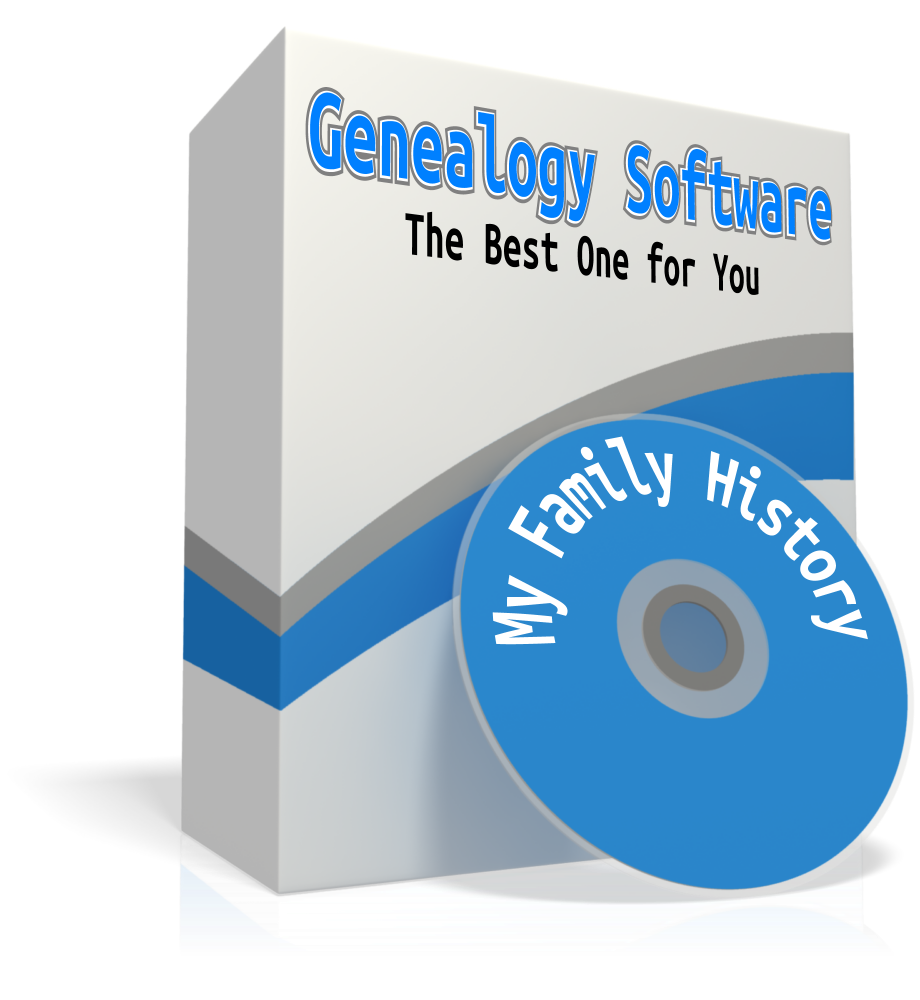 Do you keep your master family tree on a website somewhere or on your computer? Lisa is a firm believer that you should keep it yourself. Click here to read why and learn more about various options for genealogy software for Mac and Windows.
Do you keep your master family tree on a website somewhere or on your computer? Lisa is a firm believer that you should keep it yourself. Click here to read why and learn more about various options for genealogy software for Mac and Windows.




